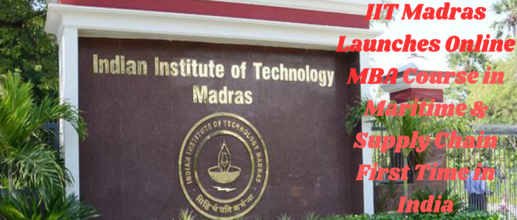
IIT Madras, the reputed Indian Institute based in Chennai, has pioneered yet another model in the arena of business with the Online MBA in Maritime & Supply Chain, which is the first of its kind in the entire world. This unique online program targets working professionals globally to enable them to develop skills for managing vanguard currents of digital disruption that are sweeping through the maritime and supply chain sectors.
Nearly 95 percent of international trade by volume passes through the sea, making the maritime industry one of the most significant sectors of the global economy. Concerning the preconditions required in the modern world, there is a growing demand for highly qualified specialists who master not only the classical performance of maritime commerce but also state-of-the-art digital tools. The Online MBA in Maritime and Supply Chain at IIT Madras is tailor-made for such students to provide more insight and expertise through the requirements of the contemporary maritime and supply chain industry.
The admissions process includes an IIT Madras Admission Test, followed by a PI. IIT Madras online MBA applications are currently being accepted for the first batch. The program is set to commence in September 2024. Candidates who have completed a UG degree with 60% are eligible to apply for IIT Madras Online MBA Admission 2024. In addition, they must have a minimum of 2 years of work experience.
IIT Madras offers an Online MBA in Maritime and Supply Chain, a designed 24-month program. The program begins with the fundamental concepts of maritime and supply chain management and then delves into how digital technologies can support these concepts. Here's a deeper dive into some key modules:
Digital Transformation in the Maritime and Supply Chain: Perhaps, it would be worth noting that this module sensitizes the students with extensive knowledge on the digitized landscape of these industries. They will delve into the potential applications of emerging technologies.
Data Analytics for Maritime Operations: Using the tools and techniques they will learn, students will be able to collect, analyze, and make decisions about maritime data and trends.
Beyond Textbooks: Real-World Impact
What distinguishes the program from theoretical knowledge is the use of business cases, industry speakers, and industry-based assignments. This ensures graduates acquire not only a strong foundational understanding of digital concepts but also the practical skills to implement these technologies effectively:
One of the biggest advantages of the program under analysis is that it is a blended online learning program. The material effectively connects the online learning modules with the on-campus intensive sessions. This approach addresses the demands of working professionals by offering:
Graduates will be well-positioned to secure leadership roles in various segments of the maritime industry, including:
Therefore, IIT Madras’s pioneering Online MBA brings an exciting and unsurpassable opportunity for working professionals to upgrade themselves in terms of skills and knowledge that are going to be highly demanded as the professional world steps into the digital era of maritime & supply chain management. Actually, this program cannot only enlighten graduates but also promote the maritime and SCM market environment in the context of efficiency, sustainability, and global competitiveness of future market shipping on the smooth flow of worldwide trade for many years ahead.